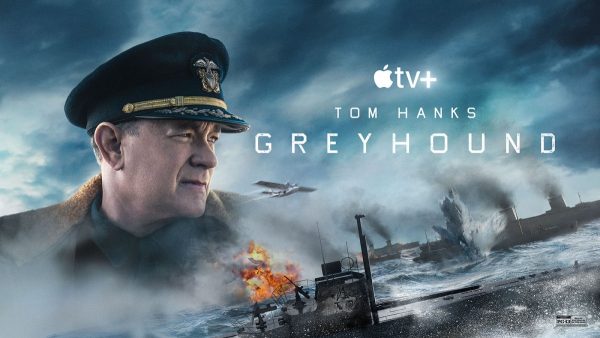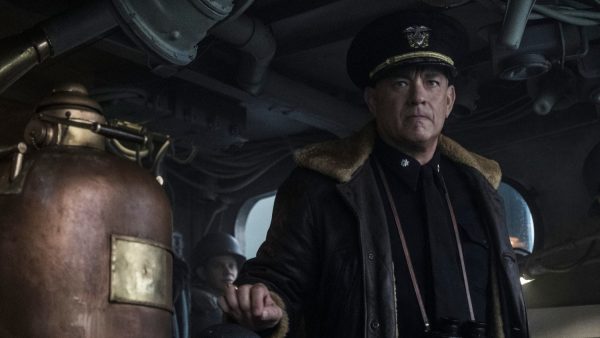Greyhound, 2020.
Directed by Aaron Schneider.
Starring Tom Hanks, Stephen Graham, Tom Brittney, Rob Morgan, and Elisabeth Shue.
SYNOPSIS:
Early in World War II, an inexperienced U.S. Navy captain must lead an Allied convoy being stalked by Nazi U-boat wolfpacks.
As peculiar and unexpected a year as 2020 has been for, well, everything, few among us could’ve ever anticipated that a Tom Hanks blockbuster of all things would find its theatrical release cancelled entirely, with Sony ultimately selling the distribution rights to Apple’s VOD platform AppleTV+.
Then again, filming on this claustrophobic World War II thriller began all the way back in March 2018, suggesting a project which Sony wasn’t quite sure what to do with. Apple paying $70 million for the movie, then – far in excess of its $50.3 million budget – may have been a blessing in disguise, because despite the perennial box office appeal of Tom Hanks, Greyhound isn’t quite the war movie its slushy marketing suggests.
Based on C. S. Forester’s novel The Good Shepherd, Greyhound follows Captain Ernest Krause (Hanks), the neophyte commander of the destroyer vessel USS Keeling (aka Greyhound), as his ship and the surrounding Allied convoy are ambushed by a fleet of German U-boats while crossing the North Atlantic.
As much as that log-line has the easy makings of a bombastic, 2.5-hour tentpole filled with melodramatic subplots and relentless destruction porn, that isn’t what Greyhound really is at all. Though certainly back-loaded with digitally-assembled mayhem in its second half, much of Aaron Schneider’s (Get Low) sophomore feature is far more of a claustrophobic chamber piece, focused on the minutia of a crew attempting to intercept and evade their attackers.

Lengthy sequences are devoted entirely to crewmen relaying information between themselves and Captain Krause, as well as a seemingly bizarre focus on the mundanity of Krause’s dietary habits, the significance of which clarifies itself later on. In the early going the expected sweeping shots of German ships trawling the ocean floor are extremely few and far between, because Hunter Killer this ain’t.
For anyone banking on a more out-and-out spectacle, the movie might initially seem like a bait-and-switch, especially with its snappy 91-minute runtime suggesting a get-up-and-go approach to the central conflict. But the script – written by Hanks himself, no less – is clearly more interested in filling the canvas with rigorous technical detail. Much of Hanks’ dialogue in particular is a stream of nautical techno-babble, yet in between all the urgent order-giving, we get an acute sense of a man desperately in over his head and doing whatever it takes to keep as many of his men alive as possible.
By offering up a slight yet effective through-line of humanity, Greyhound never feels like a rote exercise in technical verisimilitude despite the relatively scant approach to character development. Much like Christopher Nolan’s Dunkirk, it is a calculated choice to foreground an anxious ticking clock scenario.
To which end, the movie certainly doesn’t leave audiences wanting for action, even if it’s certainly more at-a-distance than in other nautical war flicks. Schneider focuses more intently on the utter logistical minefield of the situation rather than glossy “Bayhem,” as Krause and his men stare down a spectral enemy which can seemingly surface at will and effortlessly glide around Greyhound’s armaments without detection.

Yes, there are CGI-doused shootouts between ships and plentiful explosions, yet again it becomes clear that Hanks is more interested in the human element. People die here without ceremony or fanfare, and though the script doesn’t take much time to develop its characters, it still stings when they’re wiped out sans-sentiment. In an eerie touch, Greyhound also periodically receives taunting radio messages from the German attackers promising imminent destruction.
Despite Schneider being a hugely left-field choice to helm a film of this scale – his wonderful debut Get Low cost a mere $7 million – he creates a palpable boxed-in mood during those early interior sequences, while later offering up stately coverage of the naval standoff.
Though the $50 million budget may have hamstrung the fidelity of the visual effects – which, while functional, aren’t great – it may ultimately have been a disguised blessing, ensuring Schneider keeps a respectful distance from the carnage rather than taking balletic, Michael Bay-aping glides through the combat site. Yet these set-pieces are no less riveting as a result, presented more like a patient chess game than a rat-a-tat murder-thon, and undoubtedly aided by a fantastically pulsing musical score from Blake Neely.
Yet all in all, the reason to watch Greyhound isn’t the wrenching claustrophobia or a fleet of ships shellacking the hell out of each other – it’s Tom Hanks. Hanks is a firmly regimented statesman of Hollywood at this point and probably couldn’t be any less than imminently watchable if he tried. Even so, he brings an immediately plausible authority to the role of Captain Krause, munching through the technical gumph with a persuasive gusto, admittedly aided by the fact that it all came from his own pen.

Hanks is also surrounded by a talented supporting cast, who even if their characters aren’t given much time to breathe, at least tease out as much humanity as one could reasonably expect. The ever-brilliant Stephen Graham is typically stellar as Krause’s second-in-command Charlie Cole, and Rob Morgan is terrific in a small yet vital role as head chef Cleveland.
Elizabeth Shue meanwhile pops up for a head-scratcher of a cameo as Krause’s love interest, yet both her role and the flashback scene in which she appears are so completely piecemeal as to feel like an afterthought cobbled together during reshoots. Her presence here, no matter her talent, adds nothing beyond lending Krause some perfunctory “character development,” and actually detracts somewhat from the film’s ruthlessly efficient clip.
This is certainly a strange movie for Tom Hanks to appear in for several reasons, but with its fast-established urgency, propulsive pace, and expectation-defying approach to naval tentpole thrills, Schneider’s film carves out an admirably dialled-back niche for itself. If you’re craving a wall-to-wall action-fest with characters you can sink your teeth into there are much better movies, but Greyhound deserves credit for trying to do something a little different with the familiar, and succeeding more often than not.
Greyhound won’t be anyone’s favourite Tom Hanks movie, but it’s a tense, affecting sprint of a naval thriller elevated by his dependably righteous performance.
Flickering Myth Rating – Film: ★ ★ ★ / Movie: ★ ★ ★
Shaun Munro – Follow me on Twitter for more film rambling.












